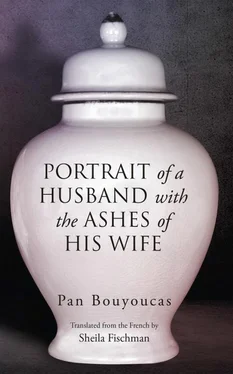Alma was just as incapable of pretending, or of holding her tongue at least, when for instance she was asked what she thought of a show. And when her husband criticized her once for having offended the artistic director of a theatre with her remarks, she had replied:
“Are courage and integrity the monopoly of the characters we play?”
“I’m not asking you to lie or to betray your convictions. You couldn’t do it and that makes me very happy. But sometimes it’s wiser to be right silently even if it’s just to avoid offending the convictions of others.”
Alma tried silence.
A week later, she told her husband:
“I know you have to be something of a whore in this job but silence only fosters mediocrity. If a show is rotten, it’s rotten, and if I’m asked what I think I won’t say the contrary to keep my name on the guest list.”
That’s how she was made, Alma. An open book. And now Nicole Gouin was getting her own back.
“A theatre’s not a graveyard or a museum,” she shrieked at the end of the corridor. “But Alma Joncas never understood that. Which was why she defended her classics so fervently, with all their fake conflicts, their fake actions and subterfuges, when the duty of theatre today is to force spectators to plunge into the depths of their own subconscious to find their genuine self in the silence of silence.”
“This theatre is also a business,” Pauline Brunet told her. “A business that has been piling up debts ever since the budget cuts by the Culture Ministry and I doubt that during this recession we can absorb those debts by plunging into the depths of our subconscious. On the other hand, Alma’s ashes can double the number of subscribers. Quadruple them even if other actors announce that they’ll leave their funeral urns to us.”
“And where will you place your dear Alma’s urn? On stage, I suppose, and the audience will observe a minute’s silence before every performance. Or maybe you’ll keep it under your desk so you’ll always have her between your legs.”
“Don’t be vulgar, jewel. You’re talking about a dead woman who was also a good friend.”
“If you loved her that much, why not use her ashes to stuff your tits? She would always be next to your heart and I’d stop feeling as if I’m kissing prunes.”
“Stop, my love, you’re killing me.”
“Yuck! Just thinking about it turns my stomach. Your old prunes, the cracks in your skin, your oozing lips, your mouse squeaks — I feel as if I’m in a sarcophagus when I lie in our bed. For consolation, I had our theatre. Now you want to turn it into a mausoleum too. But I won’t let myself be buried in it!”
The office door opened wide.
And it was Pauline Brunet’s turn to shriek.
“I’ll do whatever you want! Come back, Nicole! I’ll do whatever you want!”
 8
8 
IN THE TIMEit took to go home, Doctor Maras had erased Pauline Brunet and her theatre from his mind.
Mélissa was sitting at Alma’s dressing table. Shoulders hunched, eyes red and swollen, she was holding a brush that still contained the hairs her mother had left there the last time she’d used it.
“I miss her so much…”
He stroked her head and promised himself to decide quickly about the ashes so that he could look after his child who had also been hit hard by the tragedy.
“Still no word from Carmen?”
“No. But Zak called. He worked on Mama’s monument all last night and all day today and he invited us to Saint-Hilaire tomorrow to look at his sketches.”
As he had not received from Carmen irrefutable proof that Alma had been happiest in the place of her childhood, he wouldn’t have to go to La Malbaie. If he hadn’t received the call from Raymond Cholette yesterday, he’d have forgotten Saint-Hilaire as well and buried the ashes in the garden that night. He knew though that, if he didn’t see their first house again, the call from Raymond Cholette would always gnaw at him.
“What would you like for supper tonight?”
“I’m not hungry.”
Nor was he, all he wanted was to have something else to think about, to take everything out of the realm of emotion and back to the everyday so that it would feel as if life were continuing.
But his daughter chose to go to bed.
Twelve hours later, Mélissa was still shut away in her room and refusing to go with him to Saint-Hilaire.
“You haven’t set foot in that house since we moved to Montreal,” he told her. “You should see it again one last time. For Mama.”
He loathed that kind of argument, playing on emotions, but he didn’t have the heart to leave her there, moping in her bed. To mollify her he reminded her of all the love that her mother had invested in their house in Saint-Hilaire, all the sleepless nights spent rocking her baby, all the hours she’d devoted to playing in the garden with her little tot. He even told her what he’d heard at the Orphée the night before and for the first time since Alma’s death, they both laughed.
An hour later, Doctor Maras was not laughing at all.
On both sides of the highway to Saint-Hilaire apple trees in blossom covered the ground as far as the eye could see. The air was perfumed, and dazzling light filled the sky from horizon to horizon. Just like the day when Alma had brought him to see the house that she wanted to live in. She became impassioned at the thought of moving to Saint-Hilaire, as if she intended to redecorate the entire region. She talked and quivered so much behind the wheel that it was not the landscape but his life that Doctor Maras saw passing before his eyes.
“Zak was probably right,” he finally admitted. “In every image of your mother that I have from then she was brimming over with enthusiasm and joy, with energy and a sense of purpose.”
Mélissa squeezed his hand. It was her turn to raise her father’s morale.
“Wait and see the garden,” she told him. “Everything depends on the state it’s in.”
 9
9 
ALMA AND ALEXANDRE’Sfirst house…
The front was still the same, the street too. Deserted, as it had been long ago. Never had he got used to it. Yes, in Saint-Hilaire the gardens were bigger and more fragrant, the birds chirped all day long and at night the sky was starrier, but he needed to hear human voices, to see people, and not just behind the wheel but here they never went on foot. Didn’t even need to walk the dog. It was more oppressive during the long winter months when the snow muffled the few human sounds that came to him in summer. Besides that, he had to go to bed and get up an hour earlier to arrive at the hospital where he operated every morning, while in the evening no sooner would he arrive home than already it was time to put his child to bed.
Zak and Liza greeted them with open arms. As did their guests. There were around twenty, including Raymond Cholette, the Radio-Canada producer to whom Alma had confided that she’d spent the most wonderful moments of her life in Saint-Hilaire. There was also someone with the look of an apostle, whom Zak introduced as Frère Isaïe, spiritual leader of the Alliance universelle pour la Vie, a movement based on justice and peace, wherein members would come together around a global union wherein all creatures would be esteemed and loved for what they were.
“That’s all very well,” Doctor Maras said to his brother-in-law, “but why is he here? Why are all of them here?”
Читать дальше

 8
8 











